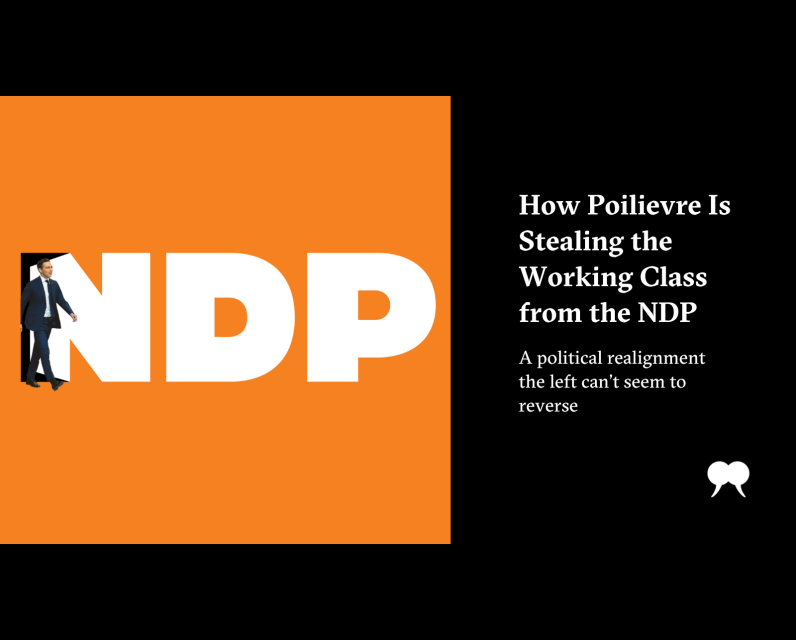How Poilievre Is Stealing the Working Class from the NDP

During the August long weekend, a Canadian politician sat in a Smitty’s diner, recording a selfie video. He talked about a waitress he met who worked at least sixty hours a week but still finds that her money “vanishes into thin air.” This, he noted, is “what I see everywhere. People telling me that they’re working harder and harder, and their money just evaporates.”
It sounds like something the leader of the New Democratic Party might say. The story is about ordinary Canadians stretched thin. It’s a story of the working class. But no, the kitchen-table parable was delivered by Pierre Poilievre, the Conservative Party leader. Canada, Poilievre said in the video, should be a country “where hard work pays off.”
Just over a month later, former journalist and left-wing activist Avi Lewis released his own YouTube video, a hype trailer for his bid to lead the federal NDP—a race to replace former leader Jagmeet Singh that will culminate in a vote at the party’s conference in March. (Lewis’s grandfather, David Lewis, was one of the founders of the party.) Canadians, he said, are living “an everyday emergency of just trying to get by in an impossible economy,” and he lamented that “working hard doesn’t earn you a living.”
You see the problem for the NDP. At a time when the rent is devouring paycheques, wealth is pooling at the top, and economic nationalism is resurgent, right wingers are beginning to sound like Canada’s leading social democratic party. A closer listen reveals important differences in the solutions they propose—more on that later—but the topline narrative is the same.
You’d be forgiven for assuming this is strictly about branding. It’s not. What the NDP is up against is much more structural, more deeply cultural. The real challenge isn’t just the language it uses; it’s semantics. The shared understanding of what words mean has shifted dramatically under the party’s feet. This fundamental change, driven by a new kind of political and ideological identity, has left the NDP struggling not just to communicate but to understand its mission as a social democratic party.
Now, with just a handful of seats left in the House of Commons and a leadership race underway, the NDP finds itself at a critical juncture. It can reclaim its mission by giving new meaning to its message, or it can keep misunderstanding the cultural landscape and fade into nothingness. Evolve—or die.
Back in April on election night, as I drove south on the 401 from Toronto to Kitchener, the NDP started to disappear around me. Seven thousand votes gone in Cambridge, compared to their 2021 showing. Six thousand or so in Kitchener South—Hespeler. Another 7,000 in Kitchener Centre itself. More than 5,000 in Wellington—Halton Hills North.
If I’d kept driving, I would have seen the same story all the way down to the border. Eight thousand NDP votes gone in Oxford. Five thousand gone in Chatham—Kent Leamington. Thirteen thousand lost in Windsor—Tecumseh—Lakeshore, and more than 6,000 in Windsor West, the latter leading to a lost NDP seat. And whereas prior to election night, pundits and wags may have expected the bulk of those votes to go Liberal, that’s not what happened. Many of them—like, a lot of them—went to the Conservatives.
All this in an election that, beyond the pressing issue of American economic warfare, was ostensibly about issues the NDP traditionally have owned. When polling firm Environics surveyed voters after the election, a quarter named unemployment, cost of living, and inflation as their primary reason for picking the party they did—that is, the Conservatives or Liberals. A little further down the list were health care and housing. Environics also found that cost of living and housing affordability were the main vote drivers for people between the ages of eighteen and thirty-nine generally, but they also ranked as most important for men and women in the forty-to-sixty-four age bracket.
It’s important to grasp what really happened in Southwestern Ontario that night—about why a party more or less built to solve these problems failed to convince people it could. It’s worth thinking about if you’re an NDP voter or member, obviously. But it matters for everyone else too. The broader social forces at play that helped vaporize those votes are not only endemic; they look increasingly toxic to the health of our democracy.
Few in the political world that April election night noticed that, in many of the areas where NDP votes were vanishing, measles cases were still appearing, part of a persistent outbreak that started months prior. It first surfaced within a community historically wary of vaccines, especially the MMR—or measles-mumps-rubella—shot, the most politicized of them all. But the outbreak hung around, spreading into a wider event for a simple reason: vaccination rates have fallen off a cliff, not just in Southwestern Ontario, but across the province and Canada.
Roughly 70 percent of children in Ontario have received the MMR vaccine, nowhere near good enough to establish herd immunity. It’s a similar story in other provinces. There are several factors behind this. A big one was the COVID-19 pandemic, which, according to one report, interrupted up to a quarter of routine childhood vaccinations. But even after the World Health Organization declared an end to the global health emergency, those rates didn’t recover. Something else is going on. People aren’t just losing their faith in vaccines; they’re losing trust in the society asking them to get the jab.
Maybe that sounds like overreach, but a 2022 Canadian study found that people with a strong sense of community belonging had a “higher uptake of seasonal influenza vaccines.” The association was “modest” but significant enough to suggest that strengthening community ties should be part of any strategy to raise vaccination rates. Strong vaccine adoption, in other words, is about more than people trusting science; it reflects how much they trust each other. Equally, vaccine hesitancy is not just about misinformation and conspiracy thinking; it’s about feeling mistrustful, alienated, unheard—alone. And that disconnection can be weaponized. It can be converted into fear and resentment.
The lesson of the vanishing votes for Canada’s leading social democratic party is the same. People don’t believe that anyone will show up for them anymore. They don’t believe in the system’s capacity to make their lives better over decades, so they seek quick policy fixes that sound good now. Driven in large part by online platforms that deliberately atomize our experience, our society now speaks a new common tongue, a hybrid language of economic frustration, grievance, and isolation.
Consumer rage and political anger now share the same vocabulary and tenor of betrayal and self-righteousness. It’s the sound of the Karens, the wellness grifters, and the sigma bros. And its key lesson is that the personal trumps the public. It is a toxic slurry in the feed. And it has poisoned our traditional sense of the collective and, even more, of solidarity.
It’s not entirely up to the NDP to fix this, but they can at least begin to give their alternative perspective a voice on a national stage. They can start fighting back.
This new cultural language is different from the one that framed the rise of Justin Trudeau’s Liberals in and around 2015. That progressive moralism—“virtue signalling” as it was known—was based, legitimately or not, on a pursuit of collective interest. Personal identity was tied to a greater cause or to one’s association with community activism. Its populist manifestation was likely to appear in well-meaning demonstrations of what the new villain-oriented vision is unable to articulate: togetherness. Yes, politicians taking a knee was cringe, but it was arguably better than politicians turning private slights into vendettas.
If the mainline criticism of the past decade in Canadian politics was that the Trudeau Liberals had gotten stuck in the heady days of their 2015 win, forever lost in the universe of that progressive moralism, then the NDP were in a black hole—not just lost but increasingly exiled into total darkness and inertia. Put another way, they just got way too far up their own ass, even for a political party. The NDP appeared at a standstill for the entirety of Jagmeet Singh’s decade of leadership, perpetually trying to re-win the 2015 election with the progressive millennials that had already flocked to, then gradually retreated from, the Liberals, whose approach the NDP nevertheless never stopped copying.
Meanwhile, the Conservatives also re-lost the 2015 election—but only once. In 2021, then Conservative Party leader Erin O’Toole introduced the germ of an idea: talking to unions. It was an interesting gambit, even though it failed. But the theory that future Conservative voters were in Canada’s working class was more or less correct. It took the terminally online Poilievre, fluent in the new online lexicon, to understand that the language of the left had been reframed to align with the agenda of the new right.
Poilievre correctly tracked the unrest building even prior to the COVID-19 pandemic—the deepening sense of burnout. The idea that we’re all giving more to get less. That working together is really about working for someone else’s benefit rather than your own. The feeling that there is little point in giving to a system that gives so little back. That, instead, what really counts is taking matters into your own hands, striking out on your own, self-optimizing, self-actualizing, self-fulfilling. Under this new cultural framework, fairness is a personal demand for what you’re owed. Common sense is the loudest opinion. Compromise is a betrayal of personal gain.
But Poilievre has a fatal flaw. He is unimaginative. He is a good politician, but he will ultimately be limited by the framework he’s so successfully adopted. Not only can he never truly deliver the à la carte public policy that he suggests ought to exist—the promises to make paycheques bigger, houses cheaper, prices lower—he will never upend the system in a fundamental way.
As a creature of today’s internet swamp, as a believer in the grievance narrative, he will continue to perpetuate the status quo. Above all, Poilievre will never tackle the inequality at the heart of the system, which is the source of most of the problems he speaks to. Not immigrants. Not the woke brigade. Not the Liberals. Rampant, unabated, crushing inequality.
Poilievre might change the tax code, but he won’t smash the grocery cartels. He’ll repeal vaccination mandates, but he won’t defend public health. He’ll mutter darkly about elites, but he’s one of them. And he is simply incapable of giving the workers he so blithely quotes in his videos what they really deserve and crave: solidarity. He will not stand up for the working class.
That’s what the federal NDP is for, or should be. They just suck at it right now. They left that job to the Trudeau Liberals, who did, to their credit, buttress Canada’s middle and working classes with things like the Canada Child Benefit and cheaper daycare.
But the Liberals are not a leftist party, and under Prime Minister Mark Carney, they will tack further back to the centre-right. Space on the left will open up—it already has. What ideas will the NDP put forward to fill it? One that Lewis mentioned in his video stands out: a wealth tax. The party floated the idea rather gently during the spring election, but they would be better to put it front and centre, and make it the marquee policy they never stop talking about.
Why? One, a wealth tax restores the NDP’s moral clarity. It puts them squarely on the side of ordinary working Canadians and turns them away from the millennial progressivism that they’ve targeted for a decade to diminishing returns. It is a gateway to discuss other key problems, like the fact that wages have stagnated, housing is too expensive, and everyday costs are still inflationary, even outside of tariffs. A wealth tax helps explain that these phenomena are not a mystery, they’re the result of a systemic problem. It helps turn anxiety into analysis.
Finally, since the NDP is already agreeing with the Conservatives to some extent, as far as messaging goes, the wealth tax simply strengthens the left’s argumentative framework. It says, yes, things do seem rigged. But it’s not the bureaucrats, the Bank of Canada, or international students that have done it. It’s decades of wealth consolidation in the hands of the few that has led to this point—with the internet’s economic disruption accelerating the process.
And that’s where the fork in the road appears: if everyone agrees the system is broken, the real question is what you do with that anger. For Poilievre, the isolation people feel is the reason to fight for themselves against each other. For the NDP, it should be reason for people to fight alongside one another.
The post How Poilievre Is Stealing the Working Class from the NDP first appeared on The Walrus.



Comments
Be the first to comment